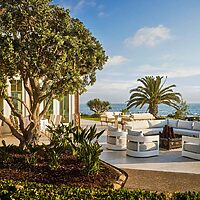We Take a Seat with the Celebrated Songwriter and Musician to Talk About His Latest Pursuit as a Restauranteur
If you’re native to Los Angeles, you’re lucky. You grew up in one of the most culturally diverse cities in America and you were raised with a palate that’s had the opportunity to savor everything from sticky Korean chicken wings, superior seafood and indisputably the best tacos north of the border. If you’re new to Los Angeles, you’re also fortunate. Our city’s food scene has swelled in the past five years, giving rise to more chef-driven restaurants than ever. Food trucks have taken a back seat to beautiful brick and mortars, where atmosphere is just as important as what is on the plate. Musician Moby
This expert knows what Los Angeles is all about—unique cuisine, changing tastes, fresh ingredients and a creative look on what it means to bring people together over a good meal.
Moby’s highly anticipated organic vegan bistro opened last November to a community that had been clamoring for the new restaurant ever since news had broke in early spring. Located on Rowena Avenue in the trendy neighborhood of Silver Lake, Little Pine has fast become one of the city’s most talked about restaurants.
We sat down with Moby, celebrated songwriter, musician, DJ, activist and owner of Little Pine to get all of the details on his new creative venture.
Q: What inspired you to create Little Pine?
Moby: I’ve been a vegan now for 28 years. In that time, veganism has completely transformed. Twenty-eight years ago being a vegan was just … sad. There were only a handful of vegan restaurants in the world. Now, Bill Clinton is a vegan, Miley Cyrus is a vegan and it’s become so much more mainstream. I am also an investor at another vegan restaurant here in LA, Crossroads, and it’s great to see all of these celebrity vegans come out of the woodwork —Johnny Depp and Paul McCartney eat there all of the time.
As veganism has become more popular, so has the quality of the food. Twenty years ago, vegan food was your typical beans and rice—now vegan food has become so interesting and sophisticated. The goal here is to have a fairly cohesive Mediterranean approach to vegan food; in a broad sense, drawing in from France, Italy, Spain and the Middle East.
Q: Tell us about your work with Greenpeace and focusing on the issue of climate change.
M: As time has passed, I’ve learned that being vegan has many benefits, but the environmental impact of raising animals for food is astounding. Twenty-five percent or more of climate change is a result of animal agriculture—more than every car, bus, boat, and plane on the planet combined.
Since there is so much interest in climate change, now my goal is to draw people’s attention to the role of animal agriculture in climate change.
Q: Are you going to use Little Pine to conjure activism in the community?
M: Yes, but in a subtle way. What I’ve found is, as far as promoting veganism, it’s easier to do when you have beautiful food in a beautiful space filled with attractive people. I don’t want to yell at people or be didactic about it; I just want to have a lovely restaurant that happens to be vegan.
Q: The design happening inside is not what you would expect from the Art Deco exterior. The interior has a modern, midcentury look. Tell us about the design process while you were building the restaurant.
M: I’ve always said there are two LA’s: the LA of palm trees and the LA of pine trees. I’ve always identified with the LA of pine trees, like Mt. Baldy and the Angeles National Forest.
I wanted Little Pine to have a Scandinavian and midcentury feel, without being too kitschy–just modern and clean, with lots of natural wood. Simple and unpretentious.
Q: How did you and Chef Kristyne Starling come together?
M: [After the departure of our first chef] I spent months trying to find a vegan chef, with no luck. I hired Kristyne to help me find a chef, and we liked working together so much that we decided she would be the chef. She, along with our other chefs and line cooks, may not come from a vegan background, but they’re all bringing their traditional cooking skills to a vegan restaurant. Kristyne also has great relationships with several farmers, which enables us to source as locally as possible.
Q: Are the beers and wine served organic as well?
M: Yes. The criterion is that everything in the restaurant is organic. The only exception to that is that there are certain farmers who can’t afford the certification process, but they are just as, if not more, organic than bigger farmers who can pay to get certified.
Q: First timer’s must-try plate for dinner?
M: The thing I am most excited about is really simple. When I was growing up one of my favorite things was stuffed shells. So our chefs have created stuffed shells with house made vegan ricotta. The dish is served with three giant shells. One is stuffed with a Kalamata olive ricotta and topped with a pesto sauce, another with a lemon and white wine ricotta with a leek sauce, and a ricotta with basil and a classic marinara sauce.
There’s also a panzanella salad that’s amazing.

Q: Take us through a typical day at Little Pine.
M: Well, we’re open every day from 7:30 a.m. until midnight, seven days a week. It’s ambitious, but I lived in France a long time ago, and I love how French bistros work; you go for breakfast, then maybe go back for an afternoon tea, and then can even go back for a romantic dinner. I want Little Pine to function like that for our community. Every day we have an afternoon tea service with a sort of modern take on a traditional tea service. We have about 60 different types of tea.
eI love restaurants in the middle of the afternoon when they’re calm and kind of empty. Musician Moby
Q: What can we expect to find in the retail shop?
M: Basically the city of LA said that because we only have six parking spaces, we had to have a retail space. At first I was turned off by it, but then I got really excited to curate it. It’s pretty much all picked out by me. When possible it has a local quality to it, a lot of the art books are from friends of mine or people in the community.
Q: Does social media affect how you develop your brand?
M: I’m very active on social. I don’t think you can really have a commercial enterprise in the 21st century and not implement it, especially when there is a strong visual component. There’s the design, the architecture, the retail space, the food and it’s all very photogenic, so by definition social media has to be part of it.
Q: Are you working on any other projects in addition to Little Pine?
M: I am putting out a memoir this year. The memoir takes place over 10 years, from 1989-1999. In 1989, I was living in an abandoned factory, making around $4, 000 a year. I didn’t have running water or a bathroom. I was a straightedge, vegan, Christian-Bible-study-teaching DJ. Then I moved to New York, got a record deal, started drinking again, and went to the other extreme of degeneracy and debauchery. The book ends at this very low moment when I’ve lost my record deal and my mom had passed away. All these terrible things were happening, and then the album Play comes out. The book is called Porcelain [a song from the album Play] and will be out this May.
What’s on the Little Pine playlist?
From Cat Stevens to Bach, Little Pine keeps it mellow and understated. No banging techno music.
Green Rockstar Musician Moby
A vegan for almost three decades, Moby has worked with organizations like Greenpeace to promote education on climate change.
Written By: Christine Williamson Pining for Moby
Photographed By: Taylor Lewis
A Californian girl, Christine spends time vacillating between the deserts in Palm Springs, the city of Los Angeles and the beaches of the OC. Christine is the founder of Spring Social, which focuses on social media and marketing for restaurants. www.Spring-Social.com
- CHRISTINE WILLIAMSON
- CHRISTINE WILLIAMSON



























